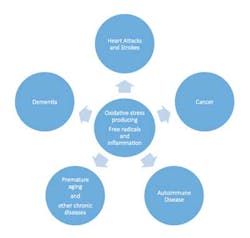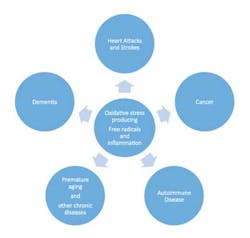Enough talk about the oral-systemic link: It's time to bridge the gap between dentistry and medicine
Countless published studies indicate that a person’s oral health has a significant impact on his or her overall health. Dental professionals frequently discuss these findings among themselves and with their patients. However, there’s still an “oral-systemic gap” between dental and medical professionals, with very little collaboration to help their mutual patients achieve optimal health.
To be honest, I did not always work closely with dentists and hygienists. It was nothing personal, just that after seven years of medical training, my oral cavity education consisted of exactly one lecture! That’s pretty typical, and most medical school graduates don’t know what they don’t know regarding the impact of high-risk oral bacteria entering the bloodstream. These bacteria contribute to cardiovascular disease, dementia, preterm labor, pancreatic cancer, diabetes, and more.
My turning point
So how did I transition from a physician with one oral health lecture under my belt to one of the nation’s strongest advocates of medical-dental collaboration?
In 2010, I attended a postgraduate training course conducted by Bradley Bale, MD, and Amy Doneen, RLNP, the originators of the Bale/Doneen method of heart attack and stroke prevention. These medical pioneers, who lecture at respected institutions such as the Cleveland Clinic, clearly demonstrated the science showing that bacteria in the oral cavity are significant contributors to heart disease and may often trigger an event such as a heart attack.
ADDITIONAL RELATED READING ...
Blood in the sink: How the relationship between oral and systemic health is gaining momentum – and what dental professionals need to know, part I
Blood in the sink: How the relationship between oral and systemic health is gaining momentum – and what dental professionals need to know, part II
As a practitioner of Third Era Medicine, which is focused on the prevention of disease rather than managing illness, this was great news! Imagine if I could empower my patients to prevent oral bacteremia, I could also significantly lower their risk of heart attack and stroke!
However, in order to achieve this, I needed to work closely with dental professionals. Today I work with many dentists and hygienists in my community as I strive to help my patients achieve optimal health.
The effort has worked extremely well. I’ve watched blood markers of inflammation profoundly drop and arterial disease objectively improve in patients whose only risk factor changed was to improve oral hygiene!
Without collaboration with dental professionals, I would not be able to offer this guarantee to my patients:
"If you suffer a heart attack or stroke while under my care, I will refund fees you've paid in the past year."
This is a powerful pact, with great potential financial risk, because I have a direct primary care practice that charges a monthly fee for a highly personalized level of care.
Building the bridge
As a physician, I am on a personal mission to urge my medical colleagues to work closely with dental professionals. In my lectures and articles, one of my key talking points is:
“Periodontal disease is a medical condition of the mouth that physicians cannot treat.”
In my day-to-day practice, I’ve made simple changes such as updating my patient history questionnaire to include the question, "Do you see blood in the sink when you brush, floss your teeth, or see your hygienist?”
If the patient answers yes, I strongly suggest that he or she have the problem addressed. If the patient does not have a regular dentist, I provide a list of recommended dentists with experience in treating periodontal disease, which of course would include local periodontists.
What can dental professionals do?
I believe every dental patient record should include the contact information for the patient’s primary care physician. For patients who do not have a regular physician, be prepared to provide a list of physicians who clearly understand the oral-systemic link.
In the event that a patient presents even with just grade I periodontal disease, check his or her records for a personal or family history of medical conditions. Explain that periodontal disease can contribute to the development of systemic diseases, and make many existing conditions more difficult to treat.
When you present the problem through the lens of it being a medical disease, and your patient understands the impact the health of his or her mouth can have on the risk of some devastating diseases, your patient may be more accepting of your treatment plan and more compliant with your hygienist’s home hygiene recommendations.
Reach out to your local physician colleagues. Explain the connection and encourage them to ask the patient during visits whether he or she has followed up for the treatment of periodontal disease.
If the answer is no, suggest they edify you by saying, "Periodontal disease is an infection that can spread to other parts of your body and contribute to many diseases. I want you to make an appointment with your dentist right away."
On my web site www.RevolutionaryHealthServices.com you’ll find two handouts that dental professionals are welcome to personalize and use to help bridge the oral-systemic gap. One handout is for you to use as part of your physician outreach. The other is to help physicians educate their patients.
Conclusion
We’re all health professionals and should be treating the whole patient, not just our respective body parts. Together, we can maximize the prevention tenets of the Third Era of Healthcare, the era of empowering an intrinsically motivated individual to create his or her own health!


